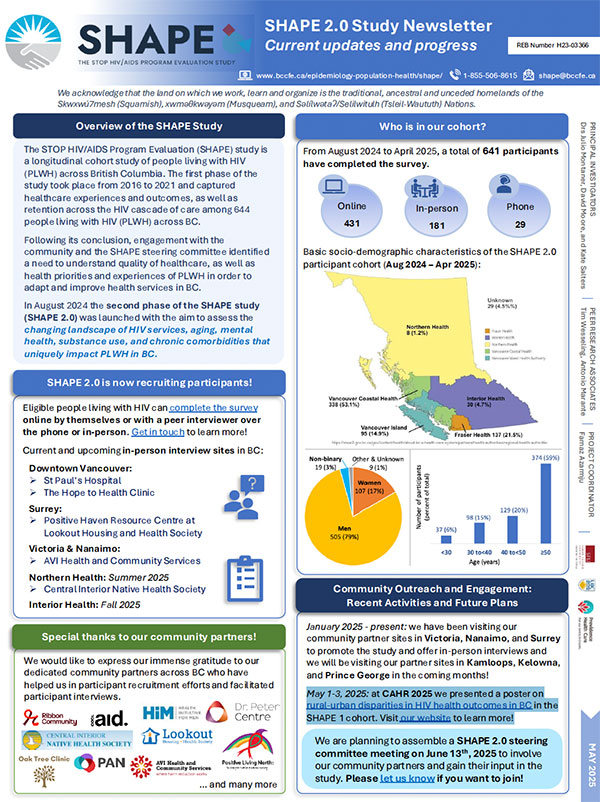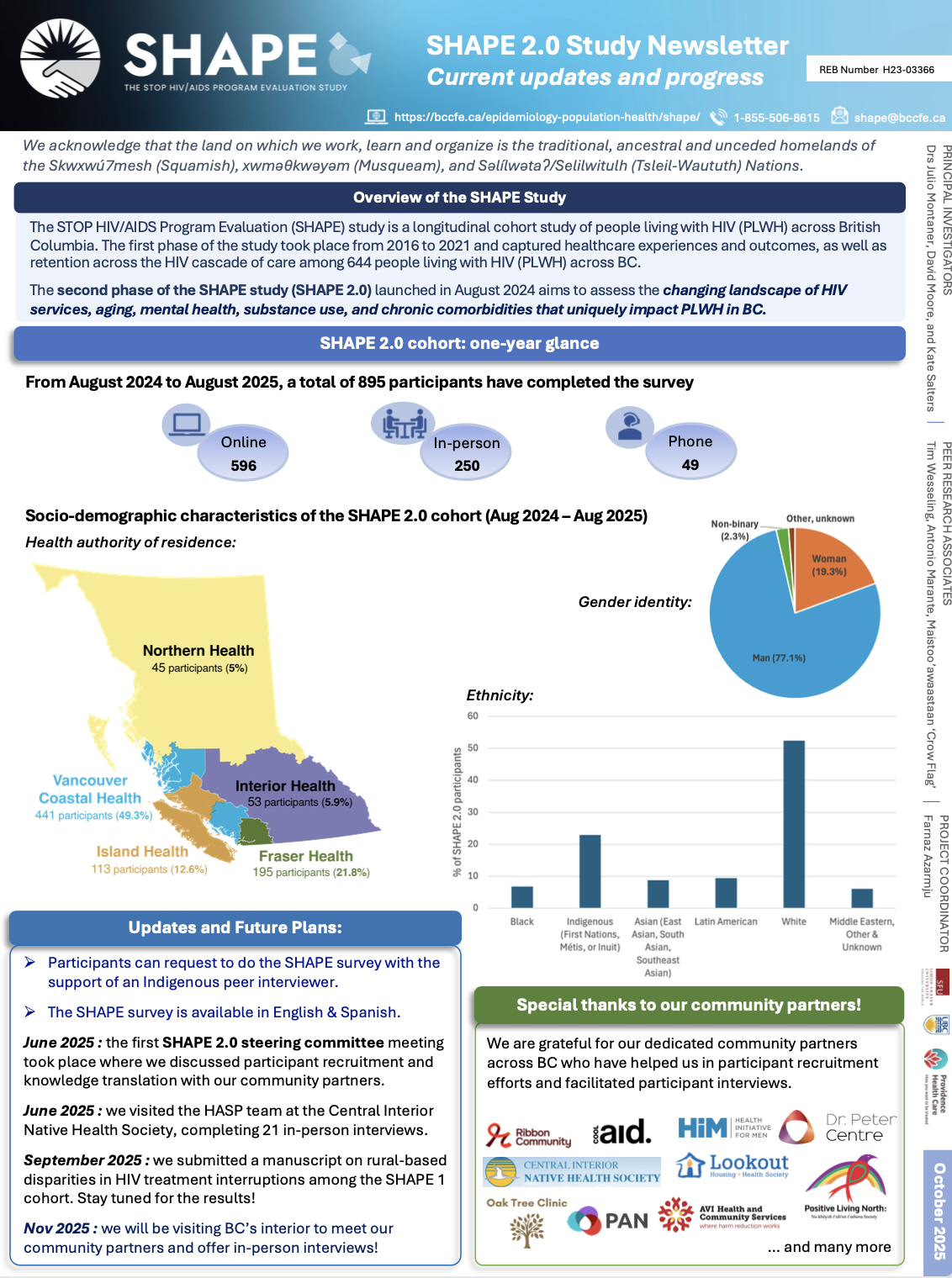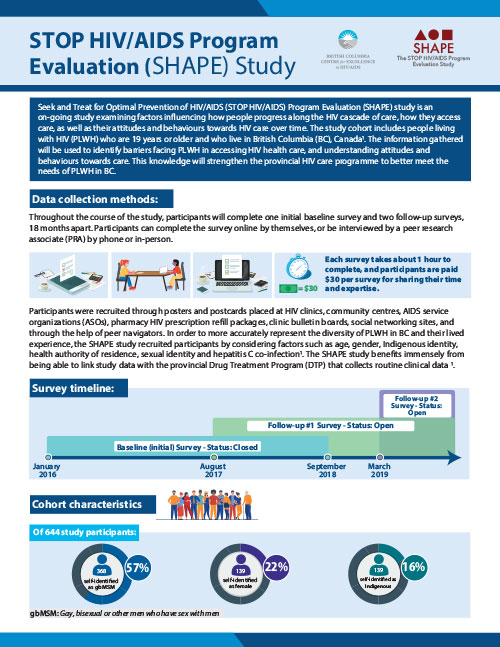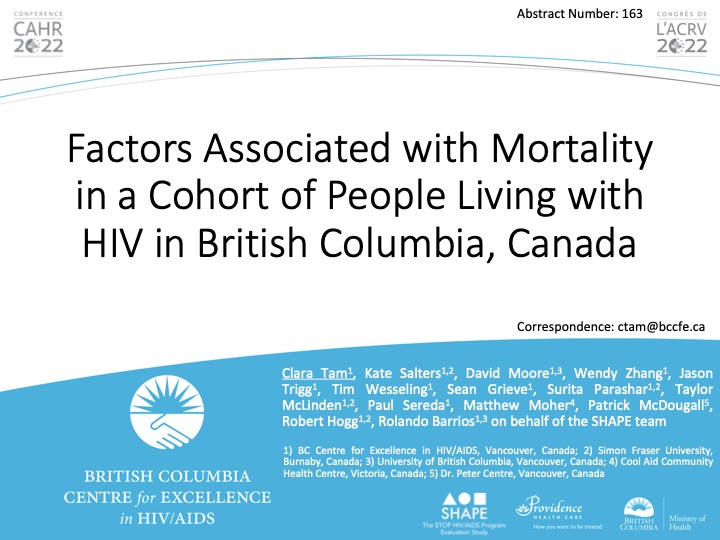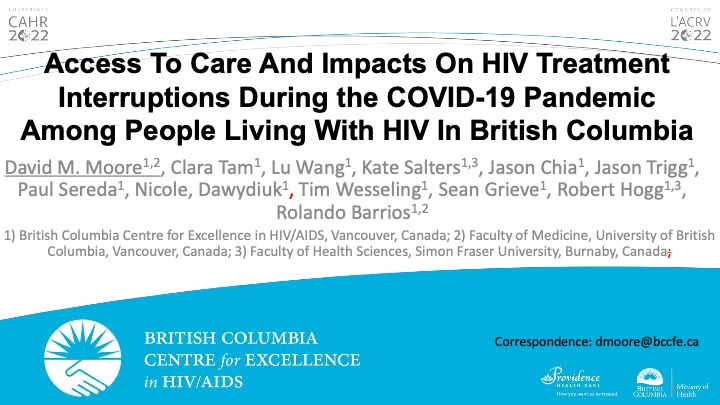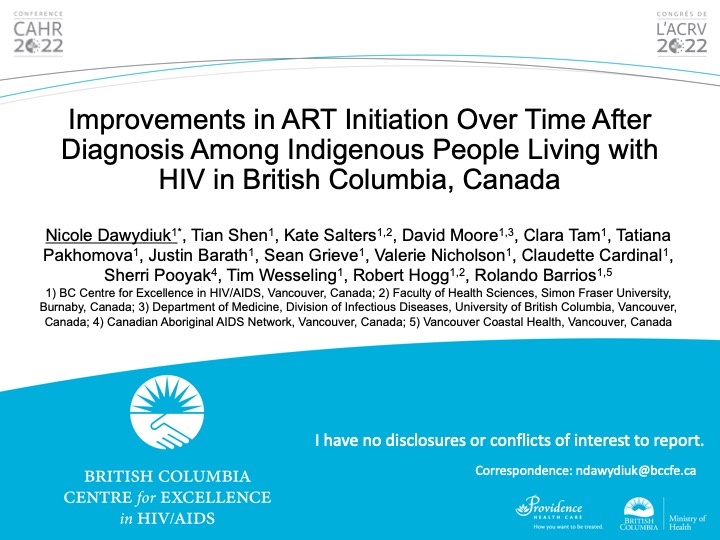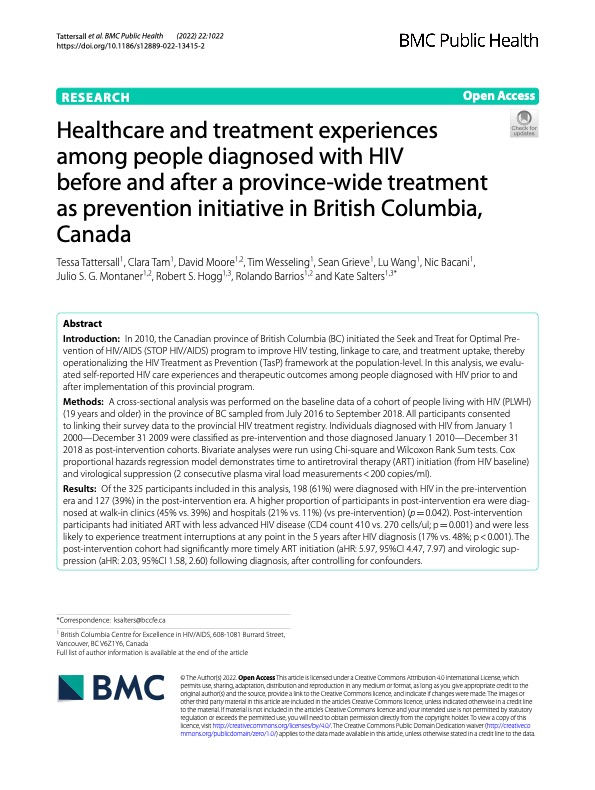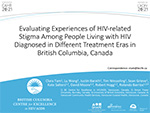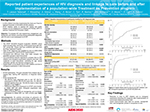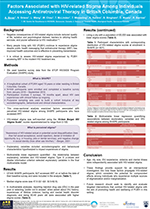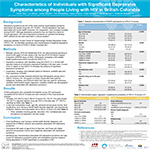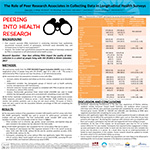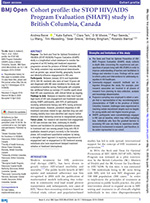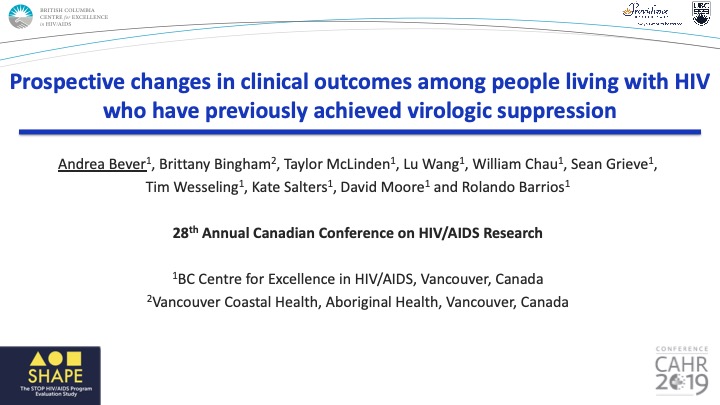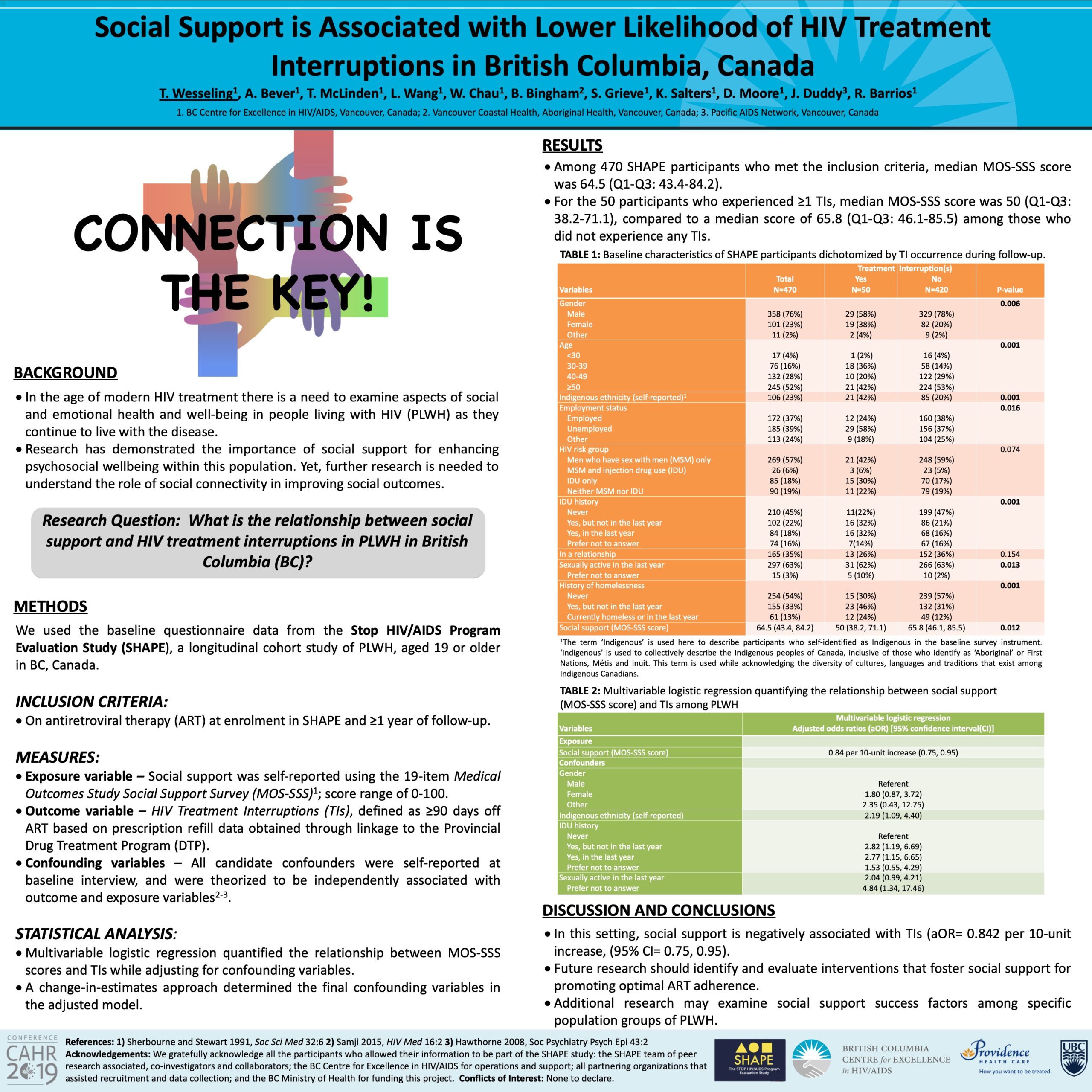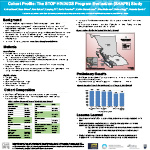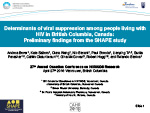SHAPE
The STOP HIV/AIDS® Program Evaluation (SHAPE) study was a longitudinal cohort study of people living with HIV across all health authorities in British Columbia. The SHAPE study first launched in 2016 in order to characterize healthcare experiences and outcomes among people living with HIV, as well as characterize retention across the cascade of care for HIV.
The ‘first phase’ of the SHAPE study wrapped in September 2021, which captured the experiences of 644 people living with HIV across BC. We continue to share research findings from SHAPE, with both academic and community audiences, and have brought back our findings to partnering sites across the province. To read more about the first wave of SHAPE, please find our publications and knowledge translation outputs at the bottom of this page under Publications, Posters, and Presentations or by going to https://bccfe.ca/epidemiology-population-health/shape/#posters-and-presentations.
In 2024 investigators at the BC CfE and all health authorities in BC are launching a new phase of the SHAPE study (SHAPE 2.0). Through community engagement and guidance from the SHAPE steering committee, we have heard that the priorities, concerns and realities of PLWH across BC has dramatically changed since the start of the provincial STOP HIV/AIDS® strategy more than a decade ago. While HIV treatment has had clear success in improving HIV-related morbidity and mortality, there is an ongoing need to understand the quality of healthcare, as well as the health priorities and experiences of PLWH in order to adapt and improve our health services. The changing landscape of HIV services, aging, mental health and substance use, and chronic comorbidities that are uniquely impacting PLWH is the focus of this new phase of the SHAPE study.
STUDIES MENU
SHAPE Participants
Are you eligible to participate?
You are eligible to participate in the SHAPE study if you are:
- Living with HIV
- 19 years of age or older
- A current resident of British Columbia
- Have had a HIV viral load test and/or received HIV medications in British Columbia
- Able to complete the survey in English o Español
- Able to provide informed consent
What does my participation involve?
If you are eligible to participate in the study, you will be asked to complete one survey, which will take approximately 30 minutes to complete.
The survey will include questions about your medical history, personal support systems, use of health care services, HIV treatment, and your perspective on your health priorities and healthcare experiences.
You will receive $40 after completing the survey.
Why should I participate?
How do I participate?
- Click the “Start the Survey” button below to read the study consent form and start the registration process to complete the survey online.
- The “Start the Survey” button will take you to the study consent page. After reading through the consent form, if you do not have any questions and agree to participating in the study, click the ‘Continue’ button to begin the study registration questions.
- Your answers to the registration questions will determine if you are eligible to participate in the and complete the survey.
- If you have already started the survey but haven’t completed it, click on the “Continue the Survey” button to continue the survey where you left off after entering your eligibility information.
If you prefer to do the survey with the help of a Peer Research Associate*, you can do this either over the phone or in-person at St. Paul’s Hospital or the Hope to Health clinic in Vancouver.
Click here to see the list of locations where we offer in-person interviews in other cities across BC.
If you would prefer to do the survey either in-person or over the phone with a peer research associate* during our hours of operation (10:00am to 4:30pm)
*A peer research associate is a member of the research team who is living with HIV. They are able to determine your eligibility, register you for the study, and take you through the survey.
In-Person Interview Locations in BC
Fraser Health
February to March 2025
- Positive Health Services at Jim Pattison Outpatient Care and Surgery Centre, Surrey
- Positive Haven Resource Centre at Lookout Housing and Health Society, Surrey
Interior Health
August to September 2025
- Kamloops Infectious Disease clinic (Juniper Clinic) at Royal Inland Hospital, Kamloops
- Infectious Diseases clinic at Kelowna General Hospital, Kelowna
Vancouver Island Health
April to May 2025
- AVI Health and Community Services, Victoria
- AVI Health and Community Services, Nanaimo
Northern Health
June to July 2025
- High Acuity Support Program (HASP) at Central Interior Native Health Society, Prince George
Study Team
| Principal Investigators: Dr. Julio SG Montaner Executive Director and Physician-in-Chief BC Centre for Excellence in HIV/AIDS Dr. David Moore Research Scientist BC Centre for Excellence in HIV/AIDS Dr. Kate Salters Research Scientist BC Centre for Excellence in HIV/AIDS |
|
| Co-Investigators: | |
| Dr. Robert Hogg | Dr. Mike Benusic |
| Scott Emerson | Meaghan Thumath |
| Robin Yates | Dr. Viviane Lima |
| Dr. Surita Parashar | Junine Toy |
| Dr. Rakel Kling | Dr. Maulik Baxi |
| Dr. Jonathan Malo | |
| Community Partners: | |
| Cool Aid Community Health Centre | Pender Community Health Centre |
| Kilala Lelum | Pacific AIDS Network |
| Insite | The Hope to Health Primary Care Clinic and Supervised Consumption Site |
| McLaren Housing Society | Heath Initiative for Men (HIM) |
| Three Bridges Community Health Centre | Downtown Community Health Centre |
| Heatley Community Health Centre | Ribbon Community |
| Spectrum Health | Dr Peter Centre |
| Vancouver Friends For Life Society | Vancouver Area Network of Drug Users |
| Oak Tree Clinic, Women's Health Research Institute | Positive Health Services, Jim Pattison Outpatient Care and Surgery Centre |
| Positive Haven Resource Centre, Lookout Housing and Health Society | Positive Wellness HIV and North Island Liver Services |
| AVI Health and Community Services | Vancouver Island Persons Living with HIV/AIDS Society |
| Island Sexual Health Community Health Centre | Kamloops Infectious Disease clinic (the Juniper Clinic), Royal Inland Hospital |
| Infectious Diseases clinic, Kelowna General Hospital | Martin Street Outreach Centre |
| High Acuity Support Program (HASP), Central Interior Native Health Society | |
| Study Staff: | |
| Farnaz Azarmju Study Coordinator |
Antonio Marante Peer Research Associate |
| Tim Wesseling Peer Research Associate |
Tatiana Pakhomova Qualitative Research Coordinator |
| Rodney Little Mustache - Maistoo’awaastaan (Crow Flag) Indigenous Peer Research Associate |
|
Recruitment Materials
SHAPE 2.0 Newsletters
Publications, Posters and Presentations
SHAPE Factsheet
The first phase of the Seek and Treat for Optimal Prevention of HIV/AIDS (STOP HIV/AIDS) Program Evaluation study (SHAPE 1.0) examined factors influencing how people progress along the HIV cascade of care, how they access care, as well as their attitudes and behaviours towards HIV care over time through a baseline and two follow-up surveys taken about 18 months apart from people living with HIV in BC.
Examining Disparities in HIV Treatment Outcomes by Degree of Rurality and Metropolitan Influence in British Columbia, Canada: 2016 - 2023
34th Canadian Conference on HIV/AIDS Research, Poster Presentation.
Azarmju, F., Iny, S., Wang, L., Chan, M., Salters, K., Trigg, J., Parashar, S., Lima, V., Sereda, P., Hogg, R., Wesseling, T., Marante Changir, A., Montaner, J., Barrios, R., Moore, D. (2025). Examining Disparities in HIV Treatment Outcomes by Degree of Rurality and Metropolitan Influence in British Columbia, Canada: 2016 - 2023. 34th Canadian Conference on HIV/AIDS Research, Poster Presentation.
Factors Associated with Mortality in a Cohort of People Living with HIV in British Columbia, Canada
31st Canadian Conference on HIV/AIDS Research, Oral Presentation
Tam, C., Salters, K., Moore, D., Zhang, W., Trigg, J., Wesseling, T., Grieve, S., Parashar, S., McLinden, T., Sereda, P., Moher, M., McDougall, P., Hogg, R., & Barrios, R. (2022). Factors Associated with Mortality in a Cohort of People Living with HIV in British Columbia, Canada. 31st Canadian Conference on HIV/AIDS Research, Oral Presentation.
Access to Care and Impacts on HIV Treatment Interruptions During the COVID-19 Pandemic Among People LIving with HIV in British Columbia, Canada.
31st Canadian Conference on HIV/AIDS Research
Moore, D., Tam, C., Wang, L., Salters, K., Chia, J., Trigg, J., Sereda, P., Dawydiuk, N., Wesseling, T., Grieve, S., Hogg, R., & Barrios, R. (2022). Access to Care and Impacts on HIV Treatment Interruptions During the COVID-19 Pandemic Among People LIving with HIV in British Columbia, Canada. 31st Canadian Conference on HIV/AIDS Research, Oral Presentation.
Improvements in ART Initiation Over Time After Diagnosis Among Indigenous People Living with HIV in British Columbia, Canada
31st Canadian Conference on HIV/AIDS Research
Dawydiuk, N., Shen, T., Salters, K., Moore, D., Tam, C., Pakhomova, T., Nicholson, V., Cardinal, C., Pooyak, S., Wesseling, T., Grieve, S., Hogg, R., & Barrios, R. (2022). Improvements in ART Initiation Over Time After Diagnosis Among Indigenous People Living with HIV in British Columbia, Canada. 31st Canadian Conference on HIV/AIDS Research, Oral Presentation.
Healthcare and treatment experiences among people diagnosed with HIV before and after a province-wide Treatment as Prevention® initiative in British Columbia, Canada
31st Canadian Conference on HIV/AIDS Research
Tattersall, T., Tam, C., Moore, D., Wesseling, T., Grieve, S., Wang, L., Bacani, N., Montaner, J. S. G., Hogg, R. S., Barrios, R., & Salters, K. (2022). Healthcare and treatment experiences among people diagnosed with HIV before and after a province-wide Treatment as Prevention® initiative in British Columbia, Canada. BMC Public Health, 22(1), 1022. https://doi.org/10.1186/s12889-022-13415-2
Evaluating Experiences of HIV-related Stigma Among People Living with HIV Diagnosed in Different Treatment Eras in British Columbia, Canada
May 2021
Tam, C., Wang, L., Barath, J., Wesseling, T., Grieve, S., Salters, K., Moore, D., Hogg, R., & Barrios, R. (2021). Evaluating Experiences of HIV-related Stigma Among People Living with HIV Diagnosed in Different Treatment Eras in British Columbia, Canada. 30th Annual Canadian Conference on HIV/AIDS Research.
Reported patient experiences of HIV diagnosis and linkage to care before and after implementation of a population-wide Treatment as Prevention® program.
May 2020
Tattersall TL, Wesseling T, Grieve S, Wang L, Bever A, Tam C, et al. Reported patient experiences of HIV diagnosis and linkage to care before and after implementation of a population-wide Treatment as Prevention® program. In: 23rd international AIDS Conference. San Francisco, CA; 2020.
Factors associated with HIV-related stigma among individuals accessing antiretroviral therapy in British Columbia, Canada
July 2019
Bever A, Grieve S, Wang L, Chau W, McLinden T, Wesseling T, et al. Factors associated with HIV-related stigma among individuals accessing antiretroviral therapy in British Columbia, Canada. In: HIV/ STI World Congress. 2019.
Characteristics of Individuals with Significant Depressive Symptoms among People Living with HIV in British Columbia
May 2020
Tam C, Wang L, Barath J, Wesseling T, Grieve S, Salters K, et al. Characteristics of Individuals with Significant Depressive Symptoms among People Living with HIV in British Columbia. In: Canadian Association for HIV Research Conference: Hope, Victories, and Perseverance beyond 2020. Virtual - Quebec City, Quebec; May 2020.
The Role of Peer Research Associates in Collecting Data in Longitudinal Health Surveys
2020
Tam C, Wang L, Bacani N, Wesseling T, Grieve S, Salters K, et al. The Role of Peer Research Associates in Collecting Data in Longitudinal Health Surveys. In: Canadian Association for HIV Research Conference: Hope, Victories, and Perseverance beyond 2020. Virtual - Quebec City, Quebec; 2020.
Cohort profile: the STOP HIV/AIDS® Program Evaluation (SHAPE) study in British Columbia, Canada
May 2020
Andrea Bever, Kate Salters, Clara Tam, D M Moore, Paul Sereda, Lu Wang, Tim Wesseling, Sean Grieve, Brittany Bingham, Rolando Barrios
Prospective Changes in Clinical Outcomes Among People Living with HIV Who Have Previously Achieved Virologic Suppression
May 2019
Andrea Bever, Brittany Bingham, Taylor McLinden, Lu Wang, William Chau, Sean Grieve, Tim Wesseling, Kate Salters, David Moore and Rolando Barrios. Canadian Association of HIV Research (CAHR 2019). Oral Presentation.
Social Support is Associated with Lower Likelihood of HIV Treatment Interruptions in British Columbia, Canada
May 2019
Tim Wesseling, Andrea Bever, Taylor McLinden, Lu Wang, William Chau, Brittany Bingham, Sean Grieve, Kate Salters, David Moore and Rolando Barrios. Canadian Association of HIV Research (CAHR 2019). Poster Presentation.
Prevalence and Predictors of Viral Suppression among People Living with HIV in British Columbia, Canada: Findings from the SHAPE Study
Jul 2018
Andrea Bever, Kate Salters, Taylor McLinden, Clara Wang, Nic Bacani, Justin Barath, Paul Sereda, Lianping Ti, Surita Parashar, Caitlin Olatunbosun, Gina McGowan, Robert Hogg, Rolando Barrios. The Internationals AIDS Conference (AIDS) 2018. Poster Presentation.
Cohort Profile: The STOP HIV/AIDS® Program Evaluation (SHAPE) Study
Apr 2018
Andrea Bever, Sean Grieve, Kate Salters, Lianping Ti, Surita Parashar, Caitlin Olatunbosun, Gina McGowan, Robert Hogg, Rolando Barrios. Canadian Association of HIV Research (CAHR) 2018. Poster Presentation.
Determinants of viral suppression among people living with HIV in British Columbia, Canada: Preliminary findings from the SHAPE study
Apr 2018
Andrea Bever, Kate Salters, Clara Wang, Nic Bacani, Paul Sereda, Lianping Ti, Surita Parashar, Caitlin Olatunbosun, Gina McGowan, Robert Hogg, Rolando Barrios. Canadian Association of HIV Research (CAHR) 2018. Oral Presentation.

